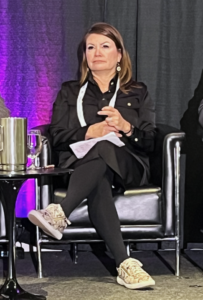Curve Lake citizen offers insight on Indigenous rights and engagement at Toronto conference

By Sam Laskaris
TORONTO – Saga Williams has spent more than 20 years being involved not only in land claims settlements, but also various high-profile projects since being called to the bar.
These initiatives include energy, mining, and economic, and policy development initiatives.
Williams, a member of Curve Lake First Nation, was also a speaker earlier this month at the Prospectors & Developers Association of Canada (PDAC) conference held in Toronto.
The programming for the four-day event, which wrapped up Mar. 5, included numerous Indigenous-themed sessions.
Williams, who also owns AS Williams Consulting, was a speaker for a session titled, Indigenous rights and engagement in a global context.
One of her key clients is the First Nations Major Projects Coalition.
“We are a national organization representing over 175 First Nation communities across this country,” Williams said. “So, if you’re talking about jurisdiction, we have membership in all of the jurisdictions across Canada, except for Nunavut, which we will be expanding into.”
Williams said a coalition goal is to look at providing an equity share in ownership for major projects across the country. She added major projects are defined as those with at least $100 million dollars of community investment.
“We firmly believe that any resource development that happens in Canada, or across Turtle Island for that matter, happens on the traditional lands of Anishinaabe people, of the Indigenous peoples here and that they need to be a part of those lands and the constitutional construct within our country,” Williams said.
She also said that over the years, various anti-Indigenous policies have targeted not only ideologies but also the removal of Indigenous peoples from their lands.
“So, there’s a lot of things that we have to overcome,” Williams said. “And I really think the more that we can support and ground ourselves in that space of inherent rights and Indigenous knowledge, the better partners we will be in in industry and in resource development within this country.”
When Indigenous communities are collaborating on projects, Williams also said time is of the essence since investors typically want to move quickly on projects.
Those in Indigenous communities, however, need to take information, absorb it, and make informed decisions at their own pace.
“We need to find a balance where we have good informed conversations, where the community members are brought along in the process because they’re the ones that are going to have to live with that development,” Williams said. “It’s their lands that are being impacted, their lifestyle that’s being impacted. So, we really need to look at how to engage the community in an informed way.”
Another need is to determine what works in communities.
“We need to develop processes that move at a community pace,” Williams said. “We need to provide the proper capacity, resources, and supports that communities can make informed decisions. And then we have to have good solid agreements in place that not only speak to a financial benefit in terms of an equity share, but looking at what do employment and training opportunities look like. And how do we create measurable targets where we can see community members as part of the mining workforce and how do we create wraparound services that allow those community members to be employed in meaningful ways.”
The PDAC conference is considered the world’s premier mineral exploration and mining convention.
The PDAC conference has been held annually in Toronto since 1932. This year’s event featured about 27,000 delegates from more than 135 countries.


